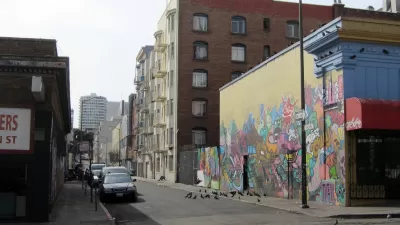As California debates the future of rent control in its municipalities, a group of Stanford economists have conducted research that connects San Francisco's existing policy with higher housing costs.

In San Francisco, writes Katy Murphy, existing rent control policy "has saved tenants in those units thousands of dollars per year. But it brought on a crippling side effect, according to a provocative new Stanford paper: Many landlords stopped renting out those coveted apartments."
"Since the policy took effect in 1995, the number of renters living in such units dropped by a staggering 30 percent as the rentals were rebuilt or converted to condominiums or single-family homes [...]" By converting to non-rental units, property owners could legally evade the requirement to control rents.
Tenants of rent-controlled units have clearly benefited, but has the city as a whole? "The same policy caused rents citywide to rise 7 percent, costing San Francisco renters $5 billion. A better way 'to provide social insurance against rent increases,' [the authors] suggest, could be to offer tax credits or government subsidies to renters."
Meanwhile in Sacramento, activists are seeking the repeal of 1995's controversial Costa-Hawkins Act, which limited the scope of local rent control throughout California.
Also see Reuben Duarte's analysis of Costa-Hawkins and California rent control policy.
FULL STORY: Rent-control policy `likely fueled the gentrification of San Francisco,’ study finds

Study: Maui’s Plan to Convert Vacation Rentals to Long-Term Housing Could Cause Nearly $1 Billion Economic Loss
The plan would reduce visitor accommodation by 25,% resulting in 1,900 jobs lost.

Alabama: Trump Terminates Settlements for Black Communities Harmed By Raw Sewage
Trump deemed the landmark civil rights agreement “illegal DEI and environmental justice policy.”

Why Should We Subsidize Public Transportation?
Many public transit agencies face financial stress due to rising costs, declining fare revenue, and declining subsidies. Transit advocates must provide a strong business case for increasing public transit funding.

Paris Bike Boom Leads to Steep Drop in Air Pollution
The French city’s air quality has improved dramatically in the past 20 years, coinciding with a growth in cycling.

Why Housing Costs More to Build in California Than in Texas
Hard costs like labor and materials combined with ‘soft’ costs such as permitting make building in the San Francisco Bay Area almost three times as costly as in Texas cities.

San Diego County Sees a Rise in Urban Coyotes
San Diego County experiences a rise in urban coyotes, as sightings become prevalent throughout its urban neighbourhoods and surrounding areas.
Urban Design for Planners 1: Software Tools
This six-course series explores essential urban design concepts using open source software and equips planners with the tools they need to participate fully in the urban design process.
Planning for Universal Design
Learn the tools for implementing Universal Design in planning regulations.
Smith Gee Studio
Alamo Area Metropolitan Planning Organization
City of Santa Clarita
Institute for Housing and Urban Development Studies (IHS)
City of Grandview
Harvard GSD Executive Education
Toledo-Lucas County Plan Commissions
Salt Lake City
NYU Wagner Graduate School of Public Service





























